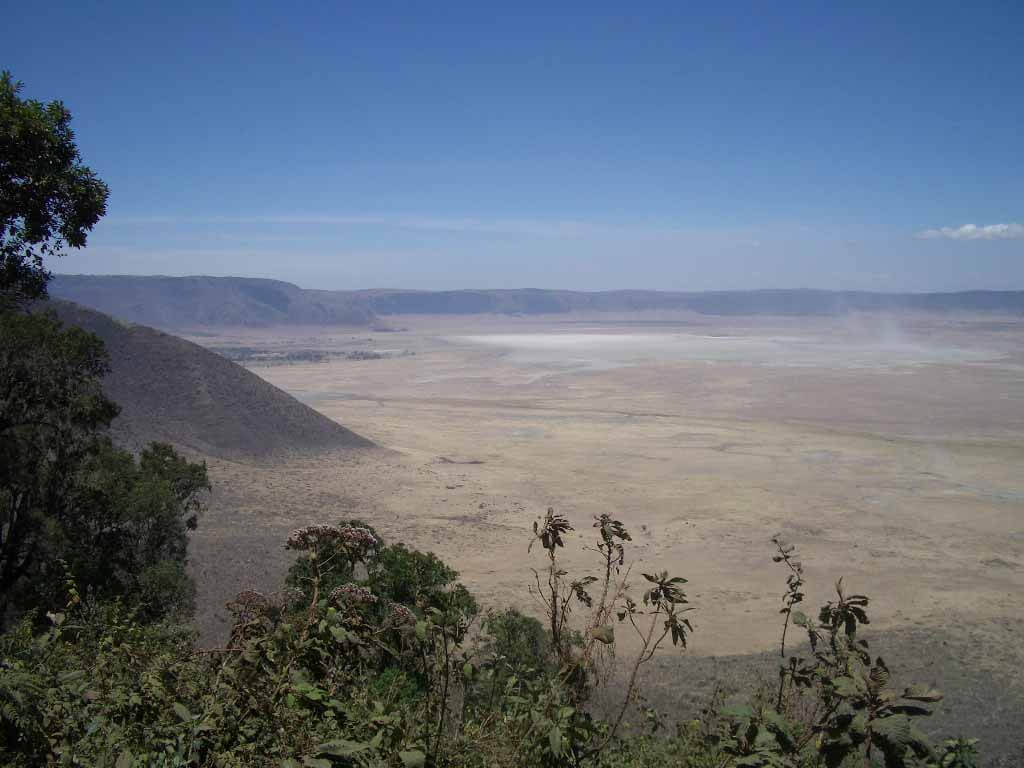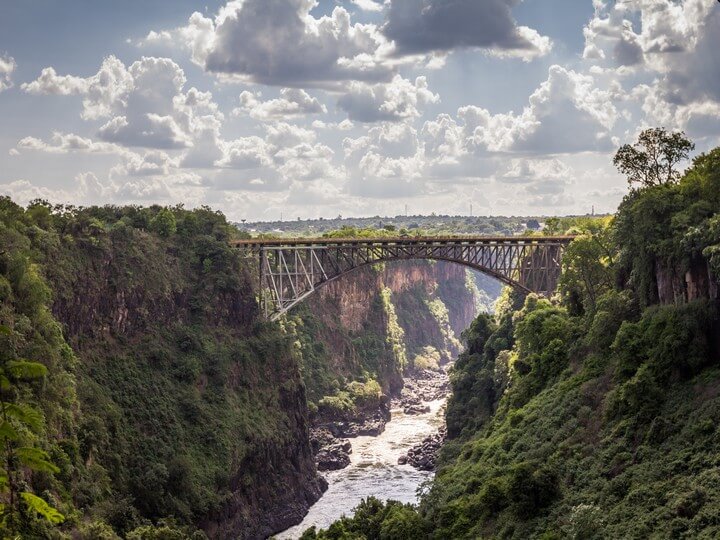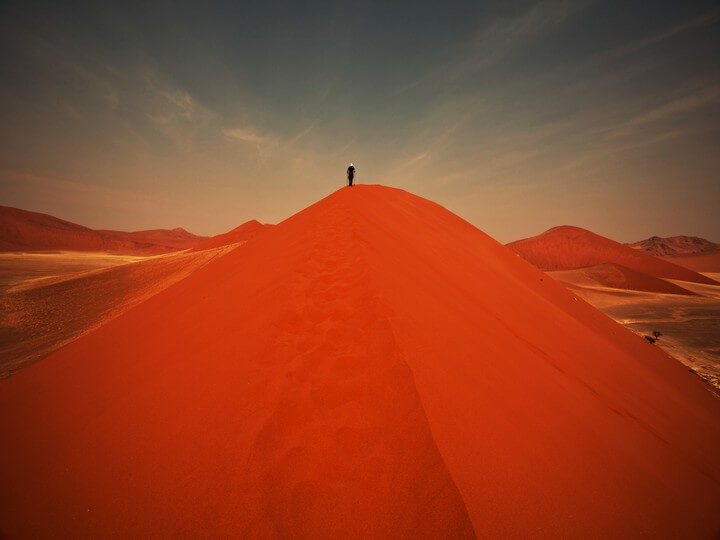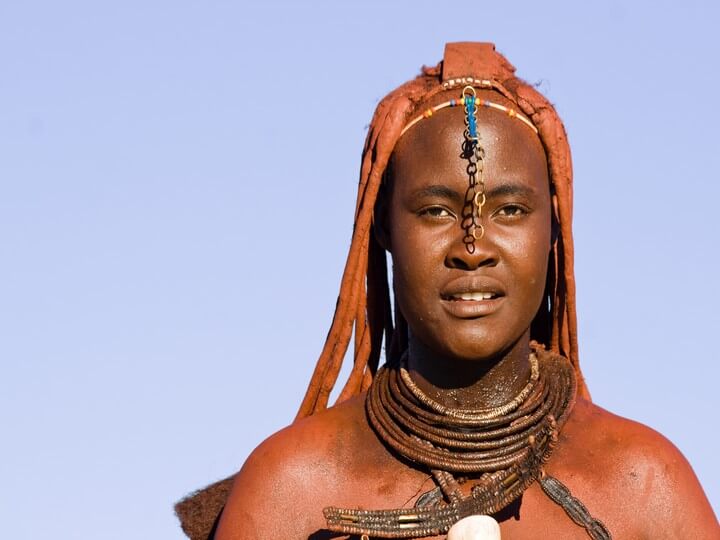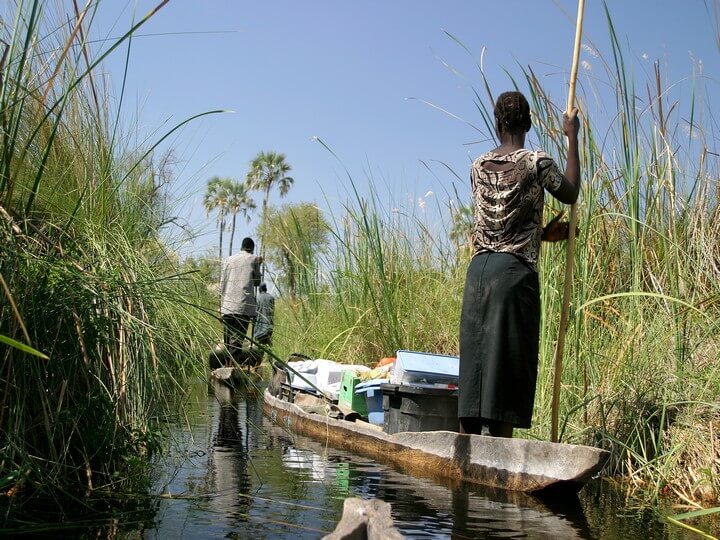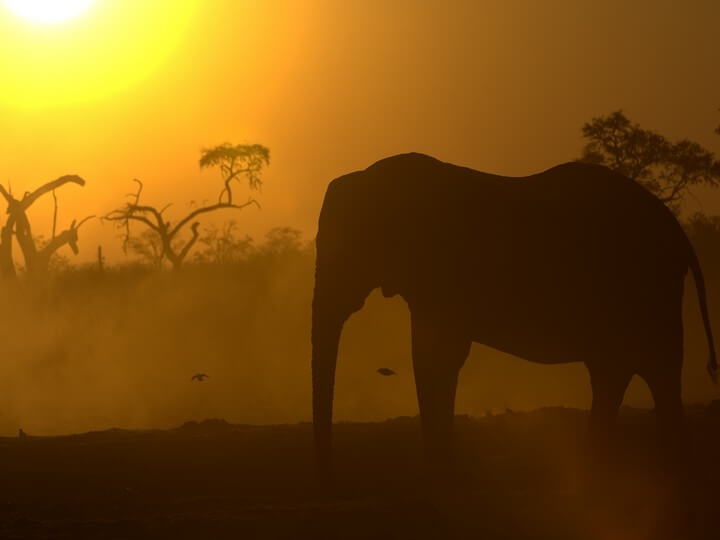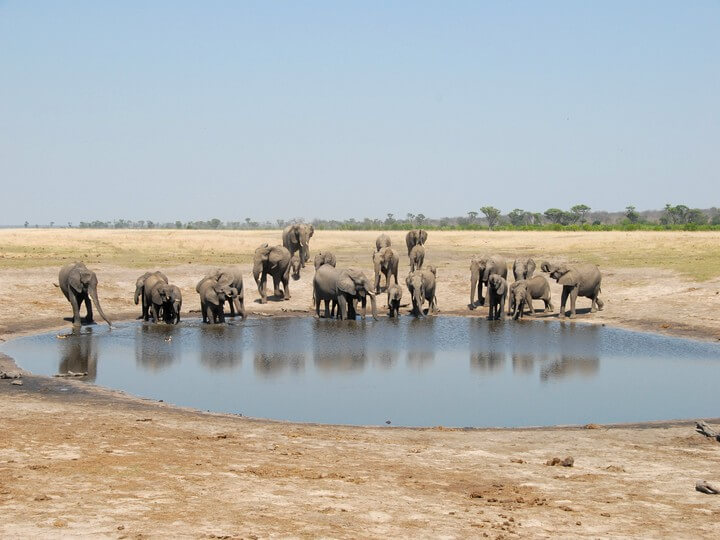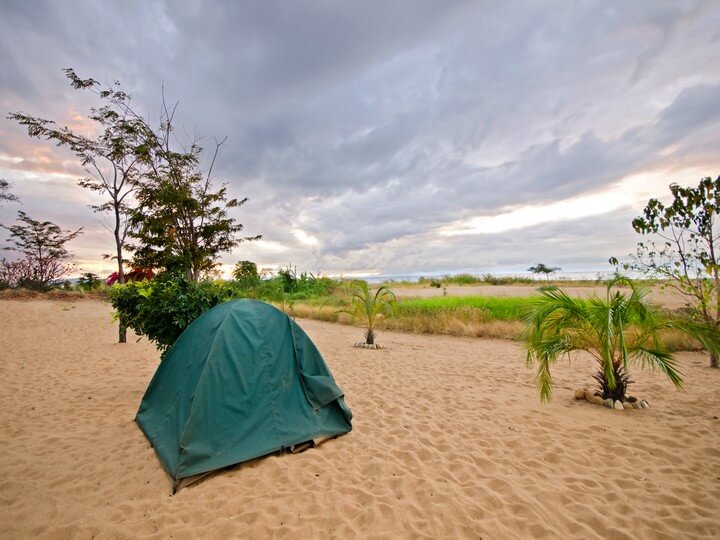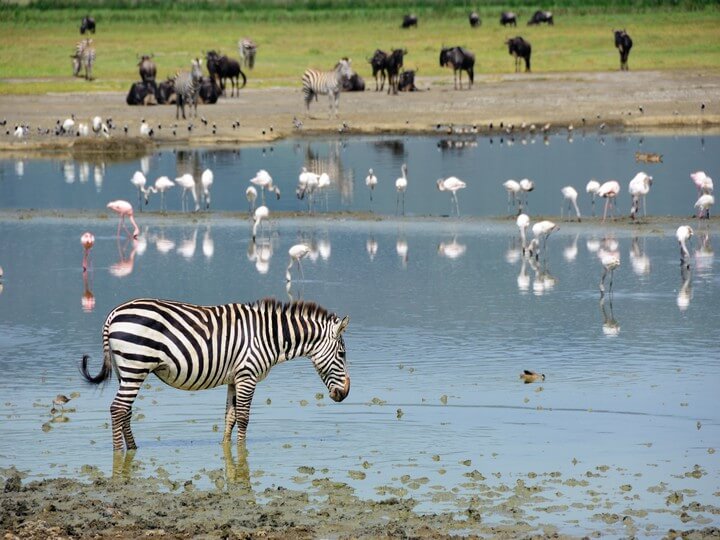| Tour start → end dates | Price | Enquire |
|---|---|---|
| 21 Dec 2024 → 30 Jan 2025 |
From R110250 |
Check Availability |
| 04 Jan 2025 → 13 Feb 2025 |
From R110250 |
Check Availability |
| 18 Jan 2025 → 27 Feb 2025 |
From R110250 |
Check Availability |
| 01 Feb 2025 → 13 Mar 2025 |
From R110250 |
Check Availability |
| 15 Feb 2025 → 27 Mar 2025 |
From R110250 |
Check Availability |
| 01 Mar 2025 → 10 Apr 2025 |
From R110250 |
Check Availability |
| 15 Mar 2025 → 24 Apr 2025 |
From R110250 |
Check Availability |
| 29 Mar 2025 → 08 May 2025 |
From R110250 |
Check Availability |
| 12 Apr 2025 → 22 May 2025 |
From R110250 |
Check Availability |
| 26 Apr 2025 → 05 Jun 2025 |
From R110250 |
Check Availability |
| 10 May 2025 → 19 Jun 2025 |
From R110250 |
Check Availability |
| 24 May 2025 → 03 Jul 2025 |
From R110250 |
Check Availability |
| 07 Jun 2025 → 17 Jul 2025 |
From R110250 |
Check Availability |
| 21 Jun 2025 → 31 Jul 2025 |
From R110250 |
Check Availability |
| 05 Jul 2025 → 14 Aug 2025 |
From R110250 |
Check Availability |
| 19 Jul 2025 → 28 Aug 2025 |
From R110250 |
Check Availability |
| 02 Aug 2025 → 11 Sep 2025 |
From R110250 |
Check Availability |
| 16 Aug 2025 → 25 Sep 2025 |
From R110250 |
Check Availability |
| 30 Aug 2025 → 09 Oct 2025 |
From R110250 |
Check Availability |
| 13 Sep 2025 → 23 Oct 2025 |
From R110250 |
Check Availability |
| 27 Sep 2025 → 06 Nov 2025 |
From R110250 |
Check Availability |
| 11 Oct 2025 → 20 Nov 2025 |
From R110250 |
Check Availability |
| 25 Oct 2025 → 04 Dec 2025 |
From R110250 |
Check Availability |
| 08 Nov 2025 → 18 Dec 2025 |
From R110250 |
Check Availability |
| 22 Nov 2025 → 01 Jan 2026 |
From R110250 |
Check Availability |
| 06 Dec 2025 → 15 Jan 2026 |
From R110250 |
Check Availability |
| 20 Dec 2025 → 29 Jan 2026 |
From R110250 |
Check Availability |
41 Day Cape Town to Kenya Epic Tour (Camping)
Tour Details
| Tour Style | Camping |
|---|---|
| Length | 41 days |
| Countries Visited | South Africa, Namibia, Botswana, Zambia, Malawi, Tanzania, Kenya |
| Starts | Cape Town |
| Ends | Nairobi |
| Group Size | Max 16 |
| Age Range | 18 years + |
| Tour SKU | CAE2513 |
What You'll Experience
- Cape Town Township Tour
- Orange River
- Fish River Canyon
- Sesriem Canyon
- Dune 45
- Spitzkoppe Bushman Paintings
- Etosha National Park Game Drives
- Kalahari Bushman Walk
- Okavango Delta Wilderness Excursion Mokoro/Walking Safari*
- Chobe National Park Fish Eagle Boat Cruise*
- Chobe National Park Open Vehicle Game Drive with Resident Guide*
- Mosi oa Tunya National Park
- Victoria Falls Visit
- South Luangwa National Park Open Vehicle Game Drive with Resident Guide*
- Lake Malawi
- Zanzibar, Return Ferry & Accommodation
- Maasai Village Walk with Resident Guide
- Serengeti & Ngorongoro Crater Excursion in Purpose Built Vehicles Game Drives with Resident Guide*
Why You'll Love this Tour
This Cape Town to Kenya Epic Camping Tour provides a broad insight into Southern and East Africa’s grandest attractions. This trip leaves from Cape Town and head off to Namibia and explore the gigantic sand dunes in ancient deserts. Relax on the sandy beaches of Malawi and the tropical island of Zanzibar. The mighty Victoria Falls is on the list after exploring the Chobe River, finishing off with the majestic Ngorongoro Crater and the infinite Serengeti plains.
- Price Beat Guaranteed
- 10% early bird discount (6 months or more)
Tour Price
FROM
R110,250
+ Activity Package (Compulsory) USD 1325
Tour Reviews
Review by Gavin S:
I had an awesome trip. Did the Cape town to Nairobi and it was fantastic. the tour leader and driver were both really cool fun guys and had the most amazing experience. We were very lucky with what we saw, even the tour leader said we were the luckiest group he’d ever had.
The whole experience of camping and cooking and trucking about with a mix of people was brilliant, even with the small hiccups that happen with so many people together. I’d really recommend you guys, we saw many other trucks on the road and ours was one of the best, the individual lockers make a huge difference, didn’t realise many other companies don’t do that.
Also,our tour leader, Daniel Fourie(not sure of spelling) was an absolutely phenomenal cook too, some of the best meals I’ve had on a holiday cooked over a campfire!
Review by Britta K:
I just wanted to let you know, I had a fab time, the food was amazing and the group really fun. Thank god I bought a sleeping bag in the end, was really cold at night especially Namibia and Zambia.
Dates Tour Length: 41 days
Included
- Meals - 40 Breakfasts, 31 Lunches, 30 Dinners
- Accommodation - Two person dome tents (33 nights), Dorm (2 nights), Tented camp (1 night), Hotel (4 nights)
- Fully equipped safari vehicle
- Camping and cooking equipment
- All road tolls and vehicle taxes
- All ground transportation
- Services of two crew
- Sleeping mattress
- Cape Town Township Tour
- Sesriem Canyon
- Dune 45
- Sossusvlei Shuttle & Guided Walk
- Spitzkoppe Bushman Paintings
- Etosha National Park Game Drives
- Kalahari Bushman Walk
- Mosi oa Tunya National Park
- Victoria Falls Visit
- Zanzibar, Return Ferry & Accommodation
- Maasai Village Walk with Resident Guide
- The Great Rift Valley
Excluded
- Activity Package* (US$ 1,325)
- Visas
- Travel insurance (Get Adventure Travel Insurance) and medical insurance
- Flights
- Departure taxes
- Airport transfers
- Sleeping bag
- Optional activities
- Tips
- Drinks
- Items of a personal nature
- N.B. Dinner in Windhoek, lunches and dinners in Swakopmund, Livingstone and Zanzibar are not included.
Activities
Some of the activities you can take part in on this tour.
- Cape Town Township Tour
- Sesriem Canyon
- Dune 45
- Spitzkoppe Bushman Paintings
- Etosha National Park Game Drives
- Kalahari Bushman Walk
- Mosi oa Tunya National Park
- Victoria Falls Visit
- Zanzibar, Return Ferry & Accommodation
- Maasai Village Walk with Resident Guide
- The Great Rift Valley
- Okavango Delta Wilderness Excursion*
- Chobe National Park Fish Eagle Boat Cruise*
- Chobe National Park Open Vehicle Game Drive*
- South Luangwa National Park Open Vehicle Game Drive*
- Serengeti & Ngorongoro Crater Excursion*
Other Activities
South Africa:
- Wine Tasting US$10
- Orange River canoeing US$40
- Desert Excursion Walk US$25
- Sand Boarding – Stand Up US$50
- Sand Boarding – Lay Down US$40
- Quad Biking US$45
- Kayaking US$60
- Deep Sea Fishing US$120
- Scenic Flights US$360
- Tandem Skydive US$200
- Swakopmund Township Tour US$40
- Dolphin and Seal Cruise US$60
- Okavango Scenic Flight per 5-seater plane – 45 min from US$650
- Okavango Scenic Helicopter Flight – 3 per chopper – 22 min from US$450
- Elephant Sands Bush Walk US$20
- Elephant Sands Game Drive US$25
- Maun Horse Riding US$65
- Vic Falls Bungee (single/tandem) US$160
- Mosi oa Tunya National Park Game Walk US$110
- Chief Mukuni Village Tour US$50
- Gorge Swing US$95
- Zambezi Jet Boating & Cable Car from US$215
- Half Day Canoe Safari US$115
- Zambezi Sunset Cruise US$70
- White-water Rafting – Full Day US$180
- Helicopter/Microlight Flight over the Falls from US$195
- Fishing – Half Day US$145
- Bridge Tour US$65
- Full Day Abseil US$190
- Village Tour US$35
- Walking safari US$60
- Game Drives from US$55
- Horse Riding US$55
- Village Walk US$10
- Livingstonia Day Hike US$10
- Snorkelling Day Trips from US$15
- Fresh Water Scuba Dives from US$45
- Canoe Hire from US$15
- Mikumi Game Dive US$150
- Massages – on the beach from US$20
- Yacht Trips (Snorkelling and sunset) US$120
- Snorkelling Day Trip US$40
- Zanzibar Food (per day) US$30 - US$35
- Spice Tour US$35
- Scuba Dive – local US$130
- Slave Markets US$15
- Arabic Fort US$5
- Palace Museum US$10
- Camel Ride US$5
Itinerary
Day 1
Cape Town – Klawer, South Africa
The tour begins in the beautiful Mother City, Cape Town – one of the most picturesque cities in the world. Before leaving the city, we take a tour to the Cape Flats, one of Cape Town’s intriguing townships where you visit the local people and community projects in the area. After spending some time here, we make our way northward to the fruit growing region of Citrusdal. Camp this evening is near to the Olifants River where you overlook the stunning Cederberg Mountains. You can visit a wine cooperative as an optional excursion and learn about and taste the wines while viewing the surrounding winelands. Spend your evening meeting the rest of the group and enjoy the first night under the African Sky.
Accommodation: Highlanders Camp – Camping in twin share tents with shared facilities
Meals: Lunch, Dinner
Distance travelled: ± 260 Km
Driving time: ± 4.5 Hours
Optional Activities: Wine tasting US$10
Day 2
Klawer – Orange River, Namibia
Carrying on north, we make our way to the drier and rockier region where we head towards the Namibian border crossing at Vioolsdrift. We camp this evening is on the Namibian side of the Gariep (Orange) River. The camp provides you with comforts like hot showers, flush toilets, grassy campsites, swimming pool, bar facilities and the Orange River is safe for swimming. You will be briefed on an optional Orange River canoe safari for later this afternoon or the following morning. Spend a night under the stars of the Ritchtersveld – a breathtaking and peaceful experience.
Accommodation: Felix Unite – Camping in twin share tents with shared facilities
Meals: Breakfast, Lunch, Dinner
Distance travelled: ± 400 Km
Driving time: ± 8 Hours
Optional Activities: Canoe safari US$40
Day 3
Orange River – Fish River Canyon, Namibia
Today you have the chance to embark on an optional canoe safari out on the river in the morning, if you did not take part the previous night. If you opt out of this, you are always free to unwind on the edge of the water for a while before we pack up and leave to the incredible Fish River Canyon. One of the natural wonders of Africa, the incredible Canyon is around 500 metres deep and over 160 kilometres long and is known as the second largest canyon in the world! Photographic opportunities are plentiful this afternoon as we take in the breathtaking descent of the sun from the canyon’s infamous sharp river bend known as ‘Hell’s Corner’. This is a fantastic opportunity to locate a quiet spot where you can marvel at the magnificent Fish River Canyon.
Trip Highlights: Fish River Canyon
Accommodation: Canyon Roadhouse – Camping in twin share tents with shared facilities
Meals included: Breakfast, Lunch, Dinner
Wi-Fi: Yes
Distance Covered: ± 180kms
Sriving Time: ± 3½ hours
Optional Activities: Canoe Safari US$40
Day 4
Fish River Canyon – Sesriem, Namibia
Following an evening spent nearby the canyon we continue north until arriving at Sesriem – the gateway to the Namib Naukluft National Park, containing the world’s oldest desert and highest sand dunes. The Namib-Naukluft National Park is the largest in Africa and fourth largest in all the world, encompassing part of the Namib Desert and the Naukluft Mountain Range. It is bigger than Switzerland, with an overall area of approximately 50,000 square km. We camp here for the night, under the star-speckled Namibian sky.
Accommodation: Sossus Oasis Overland Camp – Camping in twin share tents with shared facilities
Meals included: Breakfast, Lunch, Dinner
Distance Covered: ± 550kms
Driving Time: ± 10 hours
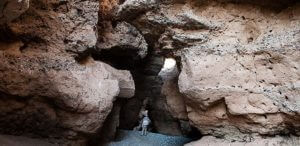
Day 5
Sesriem – Sussusvlei – Solitaire, Namibia
We head off for an early hike this morning, all the way to the top of the breathtaking Dune 45, where we have the exquisite opportunity of watching the African sun rise slowly across this vast desert. Brace yourself for this trek, as the dune is 300m high! After a filling breakfast to regain your strength, we venture further into the park for a shuttle ride and nature walk to Dead Vlei. As the sun continues to rise the dunes change colour before your eyes, allowing for striking photographic opportunities. Later, we make a stop at Sesriem Canyon. After a day well-spent among the dunes we head back to Solitaire, where we spend the evening relaxing.
Trip Highlights: Sunrise in the Namib Desert
Accommodation: Sossus On Foot Camp – Camping in twin share tents with shared facilities
Meals included: Breakfast, Lunch, Dinner
Distance travelled: ± 200kms
Driving Time: ± 5 hours
Optional Activities: Desert Experience US$25
Day 6 - 7
Solitaire – Swakopmund, Namibia
We leave Solitaire today, journeying on to the Atlantic coast where we spend the next two nights. We cross over the Tropic of Capricorn and allow some time for some fantastic photographic opportunities. Swakopmund is cooler, with the Atlantic Sea air drifting in off coast. There are some wonderful adventure activities for you to try out here, such as quad biking, sand boarding, skydiving, and much more. Alternatively, you can take a walk through to town where you can spend time visiting the shops, restaurants, museum and art galleries. There is also a lovely promenade on which to enjoy a long stroll, sip on a cold drink or grab a bite to eat. The following day is free to enjoy the optional activities available on offer here.
Please note: The only meal served in Swakopmund is breakfast. Then you don’t have to worry about being back for meals if you take part in half-day or full-day activities. In Swakopmund, you’ll find a variety of bakeries and cafes serving meals at reasonable prices (allow between ZAR80 and ZAR150 per meal). Take advantage of these days by relaxing and enjoying them at your leisure.
Trip Highlights: Tropic of Capricorn, Swakopmund
Accommodation: Amanpuri or similar – Dorm Bed with shared facilities
Meals included: Breakfast x2
Distance Covered: ± 260kms
Driving Time: 4½ hours
Optional Activities: Sandboarding – Stand Up US$50, Sandboarding – Lay down US$40, Quad Biking US$45, Skydiving US$200, Deep Sea Fishing US$120, Scenic Flights US$360, Swakopmund Township Tour US$40, Dolphin and Seal Cruise US$60, Kayaking US$60
Day 8
Swakopmund – Spitzkoppe, Namibia
Today we leave the coast to head inland into Damaraland before stopping off at Spitzkoppe, where we take a look at some of the incredible ancient bushman paintings on display. The rock formations are wonderfully intriguing, with some peaking at 1,800m above sea level, providing visitors with breathtaking views. Be sure to have a look at ‘Bushman Paradise’, a famous rock painting in the area.
The Spitzkoppe restcamp nestles at the base of the mountain and is owned and looked after by the local community. The proceeds from your stay here goes directly back to the community.
Trip Highlights: Spitzkoppe, Bushmen Paintings
Accommodation: Spitzkoppe Community Camp – Camping in twin share tents with shared basic toilet facilities
Meals included: Breakfast, Lunch, Dinner
Distance Covered: ± 150km
Driving Time: ± 3 hours
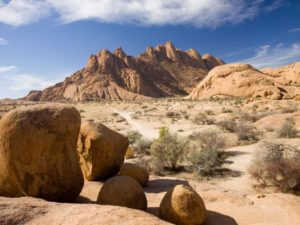
Day 9
Spitzkoppe – Etosha National Park, Namibia
From Spitzkoppe we travel north again making our way to Etosha National Park which surrounds a central salt depression or ‘pan’. This is a fantastic game-viewing spot that allows for wonderful visibility of the reserve’s animals that make their way down to drink. The Park also offers not only an abundance, but an array of wildlife, in total supporting about 114 mammals and 340 bird species. The following two nights are spent here and accommodation is near a floodlit waterhole where you have the chance of spotting elephant, giraffe, zebra, lion, rhino and hyena.
Trip Highlights: Etosha National Park, Floodlit Waterhole Game Viewing
Accommodation: Okaukuejo or Namatoni or Halali Camp – Camping in twin share tents with shared facilities
Meals included: Breakfast, Lunch, Dinner
Distance Covered: ± 420 km
Driving Time: ± 6 hours
Day 10
Etosha National Park, Namibia
Enjoy a full day of game driving in the beautiful Etosha National Park. Keep an eye out for the elephant, rhino, zebra and large amounts of other animals around the waterhole. Despite the land being of its dry nature, the park is home to a wide variety of bird species. We make our way back where we enjoy our last evening around the floodlit waterholes.
Accommodation: Okaukuejo or Halali or Namutoni Camp – Camping in twin share tents with shared facilities
Meals included: Breakfast, Lunch, Dinner
Distance covered: ± 250 km (in the park)
Driving Time: Full day game drive
Day 11
Etosha National Park – Windhoek, Namibia
Today we make our way south to the capital of Namibia, Windhoek. The German influenced city is home to approximately 200 000 people. Characterized by the increasing German style buildings, this acts as a reminder of Namibia’s early colonial history. Enjoy an evening out at one of the local restaurants.
Accommodation: Urban Camp – Camping in twin share tents with shared facilities
Meals included: Breakfast, Lunch
Distance travelled: ± 420 Km
Driving Time: ± 8.5 hours
Day 12
Windhoek – Gobabis, Namibia
Parting from Windhoek we make our way to Gobabis in Eastern Namibia. In the midst of seemingly barren terrain, we meet up with the San Bushmen and are treated to a guided bush walk and a genuine cultural experience in which we learn about these ancient people’s way of life. We are taught about how the San work with nature and manage the renewable resources around them to their maximum without damaging the fragile balance of their ecosystem. Our support of this ecotourism venture provides the San Bushmen with a sustainable income, helping to keep their fascinating culture alive.
Trip Highlights: San/Bushmen Culture
Accommodation: Zelda’s Guest Farm – Camping in twin share tents with shared facilities
Meals included: Breakfast, Lunch, Dinner
Distance Covered: ± 310kms
Driving Time: ± 4 hours
Day 13
Gobabis – Maun, Botswana
We make our way to Maun which is the fifth largest town in Botswana and is a mixture of modern buildings and native dwellings. Although it is officially still a village, Maun has developed rapidly from a rural town to a community that has distributed along the wide banks of the Thamalakane River where red lechwe antelope can still be seen grazing next to local donkeys, goats and cattle. Since Maun’s founding in 1915 it has had a reputation as a hard-living ‘Wild West’ town helping the local cattle ranching and hunting operations.
Today, Maun is a thriving tourist town that is infamous for its influx of donkeys and goats. These animals can usually be found around town waiting to transport the wares of their owners (local traders and farmers alike).
N.B. There is an option of taking a scenic flight over the Delta, either on this day, or 2 days later.
Accommodation: Delta Rain’s Sitatunga Camp – Camping in twin share tents with shared facilities
Meals included: Breakfast, Lunch, Dinner
Distance Covered: ± 520kms
Driving Time: ± 9 hours
Optional Activities: Okavango Delta Scenic Flight per 5-seater plane – 45 min flight time from US$650, Maun Horse Riding (2 Hours) US$65, Helicopter Scenic Flight per 3-seater chopper – 22 min flight time from US$450
Day 14
Maun – Okavango Delta, Botswana
An open 4×4 truck transports us to the mokoro (traditional dugout canoe) station as we head to the Okavango Delta today – a natural wetland spreading over a massive portion of northern Botswana. The Okavango River rises farther to the north in Angola and flows south, dividing repeatedly after crossing into Botswana to create an intricate floodplain of channels that spreads out into a broad, flat inland delta – the only one of its kind in the world. We enjoy the afternoon wilderness experience and overnight listening to the sound of the African night.
Trip Highlights: Okavango Delta*, Mokoro Excursion*
Accommodation: Elephant Camp – Twin share pre-erected tents with en-suite facilities (basic-style bucket shower & toilet)
Meals included: Breakfast, Lunch, Dinner
Distance Covered: ± 50kms
Driving Time: Transfer ± 2 hours
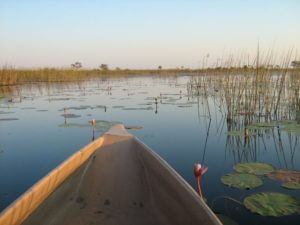
Day 15
Okavango Delta – Maun, Botswana
This morning, we make our way out of the Okavango Delta back to the polers station from where we drive back to Maun, and we spend the night here. Our aim to be back at camp around lunch time to allow for the opportunity to enjoy an optional scenic flight over this spectacular UNESCO world heritage site. The afternoon is free to relax at the pool.
Accommodation: Delta Rain’s Sitatunga Camp – Camping in twin share tents with shared facilities
Meals included: Breakfast, Lunch, Dinner
Wi-Fi: Yes
Distance Covered: ± 50kms
Driving Time: Transfer ± 2 hours
Optional Activities: Okavango Delta Scenic Flight per 5-seater plane – 45 min flight time from US$650, Maun Horse Riding (2 Hours) US$65, Helicopter Scenic Flight per 3-seater chopper – 22 min flight time from US$450
Day 16
Maun – Nata, Botswana
Departing from the Okavango Delta, we head towards our campsite at Elephant Sands Lodge situated just north of the small town of Nata. The camping area is completely unfenced, leaving wild animals to frequent the lodge’s waterhole as they please to quench their thirst caused by the dry and dusty Kalahari Desert. If luck is on our side, we may get to see some elephant, buffalo, kudu, zebra, giraffe and possibly even the odd lion or wild dog. We spend the day relaxing next to our waterhole (swimming pool), observing nature’s bounty at its best.
Accommodation: Elephant Sands Lodge or similar – Camping in twin share tents with shared facilities
Meals included: Breakfast, Lunch, Dinner
Distance Covered: ± 380 kms
Driving Time: ± 5 Hours
Optional Activities: Morning Bush Walk US$20, Evening Game Drive US$25
Day 17
Nata – Kasane, Botswana
We head toward the northern corner of Botswana today towards the town of Kasane – the gateway to Chobe National Park which is famous for being the third biggest park in the country and for being the most eclectic in terms of the animals it is home to. This includes the famous African Fish Eagle. Today we embark on a ‘Fish Eagle’ game viewing cruise along the Chobe River, giving us an opportunity witness hippo, elephant and buffalo heading to the river’s edge to bathe and drink. The Chobe River, which runs along the north-east border of the park, is a major watering spot for big, breeding herds of elephants as well as families of giraffe, sable and cape buffalo. The puku antelope can only be seen in one place in Botswana, the flood plains and you will have a chance to spot these fascinating animals. Birdlife also thrives here, and during flooding, spoonbills, ibis, various species of stork, duck and other waterfowl flock to this area.
Trip Highlights: Afternoon Boat Cruise*
Accommodation: Thebe River Lodge or similar – Camping in twin share tents with shared facilities
Meals included: Breakfast, Lunch, Dinner
Wi-Fi: Yes
Distance Covered: ± 270 kms
Driving Time: ± 5 hours
Day 18 - 20
Kasane – Livingstone, Zambia
This morning we enjoy an open vehicle game drive in Chobe National Park looking out for elephant, lion and different antelope species. After our game drive we leave Kasane and board the ferry to cross the merging Chobe and Zambezi Rivers into Zambia. Previously known as Northern Rhodesia, Zambia derived its name from the Zambezi River at independence that came in 1964. The Zambezi is the fourth longest river in all of Africa, following the Nile, Congo and Niger, and is also the largest, flowing into the Indian Ocean. We make a visit to the Victoria Falls today. At various times of the year, the spray from this mighty waterfall can be seen from up to 30 kilometres away, giving it the local name ‘Mosi oa Tunya’ meaning ‘the smoke that thunders’. During the excitement of this excursion, don’t forget your raincoat to protect yourself and your camera from delightful splashes of water.
We set up at the Victoria Falls Waterfront accommodation located on the banks of the Zambezi River which is just a few kilometres from Victoria Falls and the small town of Livingstone. The accommodation itself is tremendous and it is there that we will be given a full briefing that provides any information on all activities in the area (including rafting, canoeing, bungee jumping, abseiling, gorge swinging, elephant and horse riding, scenic flights, river cruises, etc.), allowing you to plan out your time accordingly. The campsite reception will also be available to provide you with information on transport and restaurants to visit during your stay here.
PLEASE NOTE: For the sake of practicality, meals in the Livingstone/Victoria Falls area are restricted to breakfasts only. This allows you to take on half or full day activities (several of which include lunch) without being rushed back to camp for group mealtimes. The Waterfront camp restaurant overlooks the stunning Zambezi River and offers a fine selection of reasonably priced meals and snacks throughout the day (allow US $15 – $30 per meal). Unwind and enjoy these couple of days at your own leisure or, alternatively, feel free to catch a taxi or free shuttle into Livingstone.
The next two days are free to explore the town of Livingstone and to enjoy the variety of optional activities on offer here rafting, bungee jumping and river cruises to name a few.
Trip Highlights: Chobe National Park Morning Game Drive*, Victoria Falls visit
Accommodation: Victoria Falls Waterfront – Camping in twin share tents with shared facilities
Meals included: Breakfast x3
Distance Covered: ± 80kms
Driving Time: ± 1½ hours
Optional Activities: Bungee Jumping US$160, Full Day Abseil US$190, Mosi oa Tunya National Park Game Walk US$110, Chief Mukuni Village Tour US$50, Gorge Swing US$95, Zambezi Jet Boat and Cable Car from US$215, Half Day Canoe US$115, Zambezi Sunset Cruise US$70, Full Day White-water Rafting US$180, Helicopter/ Microlight Flights from US$195, Half Day Fishing US$145, Bridge Tour US$65
Day 21
Livingstone – Lusaka, Zambia
Today we have a long full day in the truck travelling to Lusaka. Southern Africa fastest growing city is home to 1.7 million people. Camp this evening is set in a relaxing setting on a farm.
Accommodation: Eureka Camp – Camping in twin share tents with shared facilities
Meals included: Breakfast, Lunch and Dinner
Distance Covered: ± 520kms
Driving Time: ± 11 hours
Day 22
Lusaka – Petauke, Zambia
Depart early and follow the Great East Road, a scenic artery connecting Zambia to Malawi. Immerse yourself in vibrant landscapes dotted with charming villages. Cross the mighty Luangwa River, a vital source of life, before arriving at your comfortable accommodation, just 5km from Petauke. This tranquil haven serves as your launchpad for exploring Zambia’s hidden eastern gems!
Accommodation: Chimwemwe Lodge or similar – Camping in twin share tents with shared facilities
Meals included: Breakfast, Lunch, Dinner
Distance Covered: ± 450 kms
Approximate Driving Time: 9 hours
Day 23 - 24
Petauke – South Luangwa National Park – Chipata, Zambia
Unveiling South Luangwa’s Untamed Beauty! Embark on an unforgettable safari in South Luangwa National Park, a haven renowned for its staggering wildlife concentrations. Explore diverse landscapes – from lush summer plains to dry winter bushveld – teeming with over 400 bird species and 60 mammal species. Witness iconic wildlife like lions, leopards, elephants, hippos, and giraffes flourishing along the mighty Luangwa River, Africa’s most intact major river system. Choose from thrilling activities like walking safaris, village visits, and game drives (one included) to create a truly immersive safari experience!
We will embark on an open vehicle game drive with a local ranger along the river’s edge in the morning to observe the diversity of animal and birdlife in the area. We proceed to Chipata after the game drive.
Accommodation: (South Luangwa) Wildlife Camp and (Chipata): Mama Rula’s Camp – Camping in twin share tents with shared facilities
Meals included: Breakfast x2, Lunch x2, Dinner x2
Distance Covered: ± 310 km (Day 1), ± 130 km (Day 2)
Driving Time: ± 9 hours
Optional Activities: Village Tour, Walking Safari, Game Drive
Day 25
Chipata – Kande Beach, Malawi
Following our last night in Zambia we head across the border to Malawi. Formally known as ‘Lake Nyasa’, Lake Malawi covers almost an entire fifth of the country’s area, providing a strong root of livelihood for most of the local Malawi folk. Fishermen, fish traders, and canoe and net makers all practice their trades here, and a typical sight is that of a fisherman in his Bwato (dugout canoe made from a hollowed-out tree trunk) fishing on the still lake at the break of dawn. The Lake is something of a marvel to visitors and has the highest number of endemic freshwater fish species in the world. We arrive at our accommodation, situated on the lake’s shore, in the afternoon and we have the rest of the day to ourselves. Feel free to spend this time indulging in a relaxing swim or exploring the beach and surrounding areas.
Please note: Although it is our intention to adhere to the accommodation described, a certain amount of flexibility is built into our time in Malawi and the crew may make alterations to the published itinerary. Please therefore treat the Malawi section of the dossier as a guideline only.
Accommodation: Kande Beach – Camping in twin share tents with shared facilities
Meals included: Breakfast, Lunch, Dinner
Distance Covered: ± 440 kms
Driving Time: ± 11 hours
Day 26
Kande Beach, Malawi
Today is at leisure to enjoy some of the optional activities available here, some of which include water sports such as diving, and snorkeling, or horse riding along the beach. You are also free to simply unwind and delight in the fresh waters of Lake Malawi. This leg of the trip also allows you the opportunity to meet the locals who are generally known as some of the friendliest people in Africa.
Accommodation: Kande Beach – Camping in twin share tents with shared facilities
Meals included: Breakfast, Lunch, Dinner
Wi-Fi: Yes
Optional Activities: Village Walk, Snorkelling Trip, Canoe / Pedalo Hire
Day 27 - 28
Kande Beach – Chitimba Beach – Iringa, Tanzania
Today we embark on a beautifully scenic drive that takes us through rubber plantations and through to the Capital of the northern region, and third largest town in Malawi, Mzuzu. We stop for a bit to gather supplies and browse the local markets before arriving in Chitimba Beach. The afternoon is free to enjoy the surrounds of the beautiful Lake Malawi.
The following day we leave the warm beach of Chitimba, and drive a short distance north to cross the border into Tanzania. We gradually climb up through the Southern Highlands of Tanzania all the way to Kisolanza Farmhouse, our destination for the day at an altitude of 1600m. The climate is crisp and is one of the most scenic areas the country has to offer. Kisolanza has been the home of the Ghaui family for more than 70 years and it remains a working farm that provides organic meat and vegetables to the city of Dar es Salaam and neighboring markets. The Kisolanza Farmhouse is renowned for the marvelous hot showers, delectable chocolate brownies, and hot chocolate and Amarula drink that can be purchased at their quaint candlelit bar.
Accommodation: Chitimba Beach (Chitimba), Kisolanza Farmhouse (Iringa) – Camping in twin share tents with shared facilities
Meals included: Breakfast x2, Lunch x2, Dinner x2
Distance Covered: ± 240 km to Chitimba, ± 500km to Iringa
Driving Time: ± 11 hours
Day 29
Iringa – Mikumi National Park, Tanzania
Today we travel east towards the Mikumi National Park. We enjoy sundowners at the local bar and in the evening, we laze around an open fire under the stars. Our accommodation is located a short distance outside the park. If time is on our side, there is an option to do a game drive in the early evening.
Accommodation: Tan-Swiss Lodge – Camping in twin share tents with shared facilities
Meals included: Breakfast, Lunch, Dinner
Wi-Fi: Yes
Distance Covered: ± 250 km
Driving Time: ± 5 hours
Optional Activities: Mikumi Game Dive US$150
Day 30
Mikumi National Park – Dar es Salaam, Tanzania
Continuing toward the Indian Ocean coast and the port city of Dar es Salaam, or ‘Haven of Peace’, the route we follow runs through the Mikumi National Park, and with some luck we may be able to spot giraffe or elephant feeding on the roadside. Dar es Salaam is the hub of commerce and industry in Tanzania – a hot, humid and lively seaport city peppered with high rises, vibrant markets and stunning Arab-influenced architecture. It is situated on the coast, accessing one of the most crucial sea routes on earth. To most travelers though, Dar es Salaam is the port of call to the more exotic island of Zanzibar and other Archipelago islands. Our accommodation for the evening will be set up on the beach just outside of the city. We have an opportunity to browse the curio markets best known for beautiful ebony wood, to taking in the gentle sea breezes of the Indian Ocean and preparing ourselves for our trip to exquisite Zanzibar.
Accommodation: Kipepeo Village – Camping in twin share tents with shared facilities
Meals included: Breakfast, Lunch, Dinner
Wi-Fi: Yes
Distance Covered: ± 300kms
Driving Time: ± 8 hours
Day 31 - 34
Dar es Salaam – Zanzibar Island, Tanzania
Zanzibar conjures up images of idyllic sandy, palm fringed beaches; romantic winding cobbled alleys and lush tropical forests, and you will find all these here along with an interesting history. Zanzibar was the base of the great 19th century explorers such as John Hanning Speke, Richard Burton and David Livingstone and was once a major trading centre of spices. For centuries Zanzibar has traded with the people of the Arabian Peninsula for many generations, navigating the ocean in simple dhow sailboats relying on the annual trade winds for passage. The Arab influence is evident in the architecture and diverse street stall offerings of the capital, Stone Town. This influence can be seen all along the Eastern coast – the Swahili language is a result of the mixing of Arab and African languages and cultures over many centuries.
Some of the history of Zanzibar is not as romantic. The island was once a staging post for slaves bought from the African interior who were detained before being shipped to Middle Eastern slave owners. The places where these men and women were held can still be seen and even the shortest visit is enough to convey the atrocious conditions they were forced to endure. On a lighter note though, Zanzibar is the home of the Zanzibar Colobus Monkey, the Zanzibar Servaline Genet and the possibly extinct Zanzibar Leopard.
Our time spent in Zanzibar is not structured and your time is at leisure. One of the best ways to see Stone Town is on foot, where you can explore the bazaars for old maritime trinkets and cloths. You can also partake in activities such as visiting mosques, palaces, courtyards and alleyways of the old town. Spices such as nutmeg, cinnamon and black pepper are grown in nearby plantations and you are encouraged to take day tours where you are free to have your senses dazzled. If you are the kind of person who leans more toward leisure time spent on the beach, you are always free to enjoy the white sand and sparkling ocean and to simply soak up the sun’s rays. If you are looking for a good swim or dip in the sea, head out to the northern beaches to experience the warm and inviting Indian Ocean at it’s best where you can try your hand at snorkelling and diving, indulge in some tasty, lavish seafood or just relax beneath a coconut palm with a cocktail and a good book in hand.
PLEASE NOTE: In addition to basic tourist class accommodations (B&B), other meals are left for your own account after we leave the truck on the mainland. The first night is spent in Stone Town, followed by three nights at one of the beaches in the north of the island. Your guide will be able to assist you with any questions you may have or to arrange activities. There is a possibility that some group members will begin their tour in Dar es Salaam. Both old and new are invited to join in any group outings.
Trip Highlights: Stone Town, Northern Beaches, Optional Zanzibar Activities
Accommodation: Stone Town – All Seasons Hotel (1 night), Northern Beaches / Nungwi – Amaan Beach Bungalows or similar (3 nights) – Twin/ triple rooms with en-suite facilities
Meals included: Breakfast included with hotel accommodation
Wi-Fi: Yes
Distance Covered: Ferry crossing
Optional Activities: Spice Tour US$35, Slave Markets, Arabic Fort, Palace Museum, Scuba Diving from US$130, Yacht Trip US$120, Snorkelling Safaris from US$40, Massages from US$20
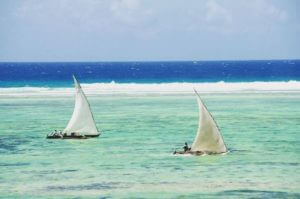
Day 35
Zanzibar – Bagamoyo, Tanzania
Take advantage of Zanzibar’s relaxed atmosphere before departing. Enjoy last-minute shopping, a refreshing swim, or simply soak up the island paradise vibes. Catch the ferry back to Dar es Salaam for your onward journey. For those continuing the adventure, head to historic Bagamoyo, a former East African trading port, nestled beside the palm-fringed beaches of the Indian Ocean. Unwind at your beachfront camp and savor the final moments of your unforgettable journey. (Please note: This extension is optional and not included for all travelers.)
Accommodation: Firefly Camp or similar – Camping in twin share tents with shared facilities
Meals included: Breakfast, Dinner
Wi-Fi: Yes
Distance Covered: Ferry crossing + 70km
Driving Time: ± 6 hours including ferry crossing
Day 36
Bagamoyo – Marangu, Tanzania
Today we leave early and travel north to Marangu. Set below the flourishing slopes of the remarkable Usambara and Pare Mountains, located in the Eastern Arc Mountain Range nestled at the base of the famed Kilimanjaro. “Marangu” means “full of water”. If the sky is clear today we may be fortunate enough to catch a glimpse of the stunning snow-capped Mount Kilimanjaro, Africa’s highest mountain of 5895m.
Accommodation: Marangu Camp – Camping in twin share tents with shared facilities
Meals included: Breakfast, Lunch, Dinner
Distance Covered: ± 500 kms
Driving Time: ±10 hours
Day 37
Marangu – Arusha, Tanzania
Driving past the town of Moshi, we arrive at Arusha – a city situated mid-way between Cape Town and Cairo. Known as the ‘safari capital’ of Tanzania, 2 million people call this area their home. We have some time to explore the town before we head off to our camp outside of the city, at the edge of the Masai plains. In the afternoon we embark on a guided walk to a local school and clinic, a Maasai Museum and the wonderful Meserani Snake Park. From here, we have time to prepare for our two-night/three-day trip to the Serengeti and the Ngorongoro Crater.
Trip Highlights: Maasai Culture Experience and Museum
Accommodation: Meserani Snake Park – Camping in twin share tents with shared facilities
Meals included: Breakfast, Lunch, Dinner
Distance Covered: ± 120kms
Driving Time: ± 3 hours
Optional Activities: Camel Ride US$5, Guided Walk US$7
Day 38 - 40
Arusha – Serengeti National Park / Ngorongoro Crater – Arusha, Tanzania
Switching to smaller, more game park-friendly vehicles, we drive west across the Great Rift Valley, passing through Mto wa Mbo know as ‘Mosquito Creek’ and entering the Ngorongoro Crater Conservation Area. Heading into the park, we drive around the crater’s rim and down onto the plains of the Serengeti. A luscious green after the rains, and brown and burnt after the droughts, this area is home to a vast variety of grazing animals, predators and birdlife. Flatter and larger than the Masai Mara, the Serengeti is simply enormous. In fact, the name is derived from the Maasai word Siringitu, meaning ‘the place where the land moves on forever’. Game viewing is a fantastic! Spending your nights sleeping in the unfenced campsite where lion and hyena roam freely is an enthralling and extremely memorable experience.
The next day we leave the plains and spend the day game driving. After lunch we begin to ascend the outer wall of the Ngorongoro Crater. It is here that we spend the night camping on the rim, where wildlife roam freely and where you will definitely need a warm jacket to combat the cold night air. The Ngorongoro, at 326 square kilometres in area, is Africa’s largest intact crater, as well as a World Heritage Site. The spectacular view from the rim (2,400 metres above sea level) makes the site from the crater’s floor even more enjoyable. All of the major mammals can be seen here, except for the giraffe who cannot manage the steep slopes leading downward to the floor of the crater.
The next morning we rise early to descend the almost vertical dirt roads for a morning of game driving and stop for lunch at the top of the crater for one last magnificent view over the Ngorongoro before heading back to our camp at Arusha.
Trip Highlights: Serengeti National Park*, Ngorongoro Crater*
Accommodation: (Serengeti National Park): Bush Camp – twin share tents with very rustic/basic shared facilities (no shower, pit latrine), (Ngorongoro Crater): Simba Camp, (Arusha): Meserani Snake Park – Camping in twin share tents with shared facilities
Meals included: Breakfast x3, Lunch x3, Dinner x3
Distance Covered: ± 300km, ± 150 km
Driving Time: Full days including game drives
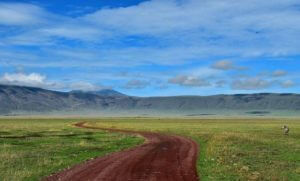
Day 41
Arusha – Nairobi, Kenya
Following our final night in Tanzania, we head across the Masai Steppe toward the Kenyan frontier. Once we’ve completed formalities at the border post of Namanga, we make our way down the last stretch of road to Kenya’s capital of Nairobi, where our tour will come to an end.
Meals included: Breakfast, Lunch
Distance Covered: +/- 270kms
Approximate Driving Time: +/- 7 hours
Onward Travel Plans
Due to circumstances beyond our control while on tour (such as border crossings, traffic, breakdowns and delays, etc), the end time on the last day cannot be guaranteed. Therefore we strongly recommend you stay the night and fly out the next day. Please consult with your booking consultant.
Pre Departure
Pre-Departure Meeting
- Pre-departure meetings are usually held the evening before the tour starts.
- Most overland tours begin in Nairobi, Kampala, Dar es salaam, Livingstone, Victoria Falls, Windhoek, Swakopmund, Cape Town or Johannesburg and held on the evening prior to the safari departure date at 6pm.
Zanzibar Excursion
- If Zanzibar is included in your tour, you will enjoy an excursion to the Zanzibar Island which includes a ferry ride for about approximately 2 hours
- The overland vehicle remains in Dar es salaam while you explore the island.
- Your accommodation on the island is included on the Adventure Pass, but not the meals (Lunch and Dinner)
- More information on the tour will be given while on tour
- You will only need a backpack for your excursion to the island (Your main back pack will be left at the truck).
- A list of items to pack for your excursion are the following:
- Passport (the island considers itself ‘apart’ and you must carry your passport when entering and leaving)
- Yellow Fever Certificate (Compulsory!)
- Change of clothes in your day pack, swimsuit, sun screen, hat, small first aid kit and towel, anti-malarials
- Money : * US$ 10 – $25 per day (other meals)
- US$ 75 – 150 (drinks, curious, local tours, etc)
Important Touring Tips:
- The itinerary is a guide ONLY and is subject to change
- There is a mix of different nationalities, ages and cultures on every tour
- Space in the truck is limited – PLEASE DON’T BRING TOO MUCH LUGGAGE!
- The tours are high adventure tours, so don’t expect European Coach tours or lodge safaris
- The tours are often created in a circular route i.e. where one tour ends, another begins
- The rate is the same throughout the year
- All meals are served from the truck unless specified otherwise
- Should you be travelling to Kenya. The Kenya government has instituted a Zero Tolerance on usage of All Plastic Bags. On the spot fines (400 USD) are being issued.
What are adventure tours?
These are adventure tours perfect for people who enjoy camping and the outdoors. You get to experience the “real Africa” by camping out at night, sitting around the campfire, taking in beautiful scenery, visiting local shops and getting to know the locals.
What is a typical day?
A typical day on either your camping or accommodated Africa overland tour starts with an early morning wake-up call and a cup of tea or coffee followed by breakfast. Campers pack-up their campsite while comfort travellers check-out of their accommodation and hit the road.
We set off to our next destination travelling through a vast variety of landscapes, making our own new memories with new friends. Each day in Africa offers a new experience from an early morning sunrise hike, quad biking, sky dive or guided nature walk. The options are endless!
We have shorter travel days arriving at our campsite by midday or early afternoon, to enjoy lunch before joining our afternoon activity or simply enjoying a relaxed afternoon at your own pace.
On our longer travel days an early start ensures an earlier arrival at our campsite. We stop off at scenic spots to stretch our legs and take in the scenery, before lunch is enjoyed at a shady spot en-route. A mid- to-late afternoon arrival at our campsite allows us to set up camp, enjoy a beautiful sunset and end the day sitting around the campfire, under the stars.
Our best advice: expect the unexpected as this is Africa! We travel mainly on gravel roads and poorly kept tarmac roads – both setting the pace at which we travel. We do our best to arrive at our next destination, safety is our number one priority and while our overland vehicles are comfortable and spacious, they are not sports cars!
What type of vehicles do we use?
- A custom-built, comfortable, safe and self-sufficient Africa overland truck to withstand the rugged African terrain.
- Various vehicles are used on varying tours, with each offering comfortable seats with ample leg room.
- Each vehicle has large glass windows for uninterrupted views and perfect for game drives.
- Smaller 4×4 land cruiser type vehicles are used for game viewing in the Serengeti and Ngorongoro Crater, due to the roads being tougher and too narrow for the overland trucks.
- Each overland vehicle includes a passenger safe to safely keep money + passports + flight tickets + credit cards. The keys are kept with your Tour Leader who will advise of safety requirements in place concerning the safe.Who is suited to go on an adventure tour?
- Almost anyone can go on an adventure.
- Some level of fitness is required due to accessing the vehicle and spending long days on bumpy roads (can take it out of you).
EAST AFRICA TOURS require a more adventurous, fearless attitude and are suited to a younger traveller.
If you are planning to trek with the Mountain Gorillas or climbing Mount Killi you will need to have a higher fitness level.
WHAT TO EXPECT ON A CAMPING OR ACCOMMODATED TOUR
Camping Tours:
A camping safari is for travellers who want a hands-on experience of Mother Nature. The guide(s) will do most of the work, but you will be required to assist with various tasks such as preparing the food, washing up, cleaning out the truck and setting up the campsite and your tent. If you dream of a lifetime African adventure, embark on a journey with us sleeping under the stars while listening to the sounds of wildlife in the distance.
We offer camping safaris suited to travellers who may prefer to travel in a younger group (aged 18 to 39). Or, you can choose a mixed age group (18 to 60). A camping safari must not be underestimated and will require active participation which means good health and a fair degree of fitness. We have a tour to suit what you have in mind, so please do not hesitate to enquire with us.
During an African camping safari you will stay in large two-man dome canvas tents which are spacious enough for two adults and your luggage. Or, you can opt to have your own tent by including the single supplement (valid on select camping tours).
Your tents are put up and taken down easily – your Tour Leader will show you exactly how to do this and help out when you are unsure. All tents are well-ventilated by means of a tent-door and window, covered with mosquito net. They also include a fly-sheet for the rain.
Most camping safaris include a sleeping mat (please do check with us upon enquiry). You need to bring your own sleeping bag, pillow and towel. All meals are prepared at the truck and you will be required to assist with the preparation.
The African campsites are basic and comfortable and you will be able to upgrade your accommodation at most of the places, but this is subject to availability. Most have warm showers and flushing ablutions, while others may have natural ablutions. Some places visited are bush camps where there are no facilities.
Accommodated Tours:
Accommodated safaris are ideal for travellers who prefer to experience African wildlife and adventure with extra comforts. You are surrounded by vast landscapes and wildlife, curiously roaming at your door-step. It is comfort, without the price tag!
Our accommodated safaris make use of a combination of lodges, hostels, bungalows, chalets, permanent safari camps, hotels and traditional huts. Our properties are ideally located at each destination for an authentic experience with incredible views.
We book Twin rooms if you are travelling with a partner or friend and Single rooms for single travellers (including single supplement). Most of the time we stay in 1-3 star properties with en-suite bathrooms in Southern Africa. In Eastern Africa we offer a combination of en-suite and shared bathrooms. In the case of shared bathrooms, you will be sharing with friends on your tour. Please bring your own towels as these are not always provided.
Select accommodated safaris include a camp assistant to help out with the smaller aspects of your vacation.
The standard of the properties varies along the trip. The Southern Africa properties are much more established than the East Africa accommodation. They vary from basic (but comfortable) to lovely properties. Due to the remote nature of the trips, accommodation choices are limited.
Distances and Road Conditions:
Our tours cover long distances so you can see significant amounts of Africa this means that there will be long days spent on the road often with nothing to look at except vast open plains. You can spend between 350km and 650km a day in the truck so it is important to be prepared.
What will you eat on safari?
Our Africa overland vehicles are fully stocked with dry goods at the start of each tour. We buy fresh produce (fruit and vegetables) almost daily to ensure fresh, good quality and tasty meals. Over the summer months fresh produce is not always available due to the heat and humidity, especially in East Africa and Mozambique – so we may have to skip tomatoes from lunch or opt for rice instead of potatoes at dinner.
Each Africa overland camping and accommodated tour include meals as per the itinerary. Often, we may only include breakfast and lunch, allowing you to enjoy dinner at a local market or restaurant. Drinks such as tea, coffee and fruit juice is included with every meal, but exclude bottle water, beer, soft drinks, alcohol etc. – these can be bought en-route or at your campsite bar.
We do cater for most dietary requirements (allergies, vegetarian, lactose-intolerant). Other requirements (gluten-free) may be more challenging on remote routes (i.e. East Africa) where starch is a stable-food in Africa. Please do speak to us about your dietary requirements and we will advise according to your trip. You will be amazed by the variety of tasty meals prepared on an open-fire!
Almost all your meals are pre-prepared over an open campfire or on the gas stove in your overland vehicle. All cooking equipment such as pots, pans, cutlery and crockery is included for you. Excellent hygiene standards are maintained at all times preparing food and washing up of kitchen equipment. Your guides will provide you with a separate washing up basin to wash hands in warm soapy water before and after each meal.
Our camping tours are limited participation tours, whereby we ask you to help out with daily chores (putting up / taking down tents) and help out your guides at meal times (rinsing, chopping vegetables).
So what are the meals like on tour? We have included a few meal options as a guideline:
Breakfast:
Tea/coffee and juice + cereals + bread/toast + fruit. Take 2 fruits and keep one for a mid-morning snack. An occasional cooked breakfast (bacon, pancakes, eggs) is made when you have more time to allow for this (normally when you spend 2 nights at the same destination).
Lunch:
Juice + bread + cheese + cold meats + salads + fruit (make a sandwich for a mid-afternoon snack)
Juice + fresh rolls + green salad (or rice salad or pasta salad) + fruit.
Dinner:
Tea/coffee and juice + chicken curry + rice, grilled or roast chicken + salad + garlic roll, grilled chicken + vegetables + salad, fish braai + salad, steak + veggies, pasta, stir-fry + rice, casserole, braai (barbeque) + salads + jacket potatoes, soup + fresh rolls.
Drinks
Tea, coffee and cordial drinks are supplied with meals but other cooldrinks and alcohol can be purchased along the way.
What about children on tour?
- Due to the nature of overland tours the minimum age limit is 18. Younger travellers (10 to 17) travelling with a parent(s) will be considered on a case-by-case basis depending on the tour, time of travel and tour availability. We do have select tours offering Family Departures, suited for children aged 10 to 17.
- Privately arranged charter tours’ age limits will be assessed based on the route and type of tour you choose.
- Please bear in mind that the Gorilla Trekking tours have a minimum age limit of 16 years.
Packing for your tour:
Packing sensibly is essential for your Africa Overland trip. One backpack and one daypack are needed and these can weigh no more than 25kg. A duffel bag is preferable as it will fit into the lockers on the truck, but you can also take a backpack with a compact, flexible, soft shell (without a hard frame). Please do not take suitcases. The airlines implement a 20kg per person limit on international flights for your luggage (your main bag) and a further 5 kg for carry-on luggage (your day bag). A good idea is to include a spare bag for curios that you may purchase, but don’t forget to include this in your weight for your trip home. A moneybelt is a useful item for keeping your money safe and hidden.
Take along comfortable, casual and semi-casual “wash & wear” clothes. Cotton is a good material for when it is hot, and fleece for when it gets cold. Pack clothes that don’t crease easily as the laundry facilities are limited. Find clothes that can be mixed and matched easily and are colour co-ordinated. A great item of clothing is zip-off pants. These double-up as shorts or trousers and are useful for when the weather changes. Reversible clothes are also very convenient and will help to reduce space in your bag.
Clothes:
- 3-4 short sleeved shirts or T-shirts
- 2 pairs of trousers or 1 pair and 1 skirt – try not to pack jeans as they take a long time to dry
- ¾ pants
- Warm sweater or fleece top
- 1-2 pairs of shorts
- Tracksuit pants
- Light sweater or sweatshirt (can also be used as an additional pillow)
- Warm fleece top
- Underwear and socks
- Hat/peak cap/bandana
- Gloves
- Scarves
- Water/wind-proof jacket
- Boots or sturdy trainers
Beachwear:
- Swimsuit
- Sunglasses
- Beach towel and/or sarong
- Sandals or thongs (need to be waterproof if you want to go white-water rafting)
Toiletries:
- Personal toiletries
- No electric shavers
- Hand sanitiser/wipes (waterless sanitisers are convenient)
- Baby wipes/wet wipes
- Tissues
- Moisturiser
- Face wash
- Facecloth
Sleepwear:
- Pyjamas
- Travel pillow
- Spare pillowcase
- Sleeping Bag
- Fleece blanket
Medication/first aid kit:
- Prescription medication
- Anti-histamine cream or tablets
- Antiseptic cream
- Sunscreen (high factor) and lip balm
- Water purifying tablets
- Pain killers
- Eye drops
- Diarrhoea medication
- Moisturiser
- Dehydration salts
- Elastoplasts/band aids
- Insect repellent (Malaria is a big problem in Africa, so the more protection the better)
- Sterile dressings
Extras:
- Water bottle
- Book (you can swap with the rest of the group)
- Extra memory/film for your camera (remember to set at the highest resolution as you might want to enlarge the pictures)
- Head torch
- Pens
- Zip-lock bags (medium sized for cameras, snacks, trash etc.)
- Extra batteries
- Travel power strip ( a compact three-plug unit that includes two USB connections. With just one wall plug you can charge five gadgets) Buy on Amazon and will help to reduce space in your bag.
- Penknife
- Watch
- Biodegradable laundry detergent
- Vaccination certificates for some areas
- Cash
- Small scrubbing brush
- A padlock for your luggage locker in the truck
- The power plugs in SA have 3 round pins. East Africa has British power plugs.
Laundry:
- There will be washing facilities at most campsites which you can make use of.
- Please remember to bring some environmentally friendly washing
- We suggest you take along crease-free clothing as the facilities available for ironing are limited
Safety on Game Drives:
- When on safari be as quiet as possible at all times and don’t make any sudden movements, this will ensure you don’t disturb the animals and get the most out of your game drive.
- Do not jump off the truck at any time.
Accommodation (Pre Tour):
- It is highly recommended to arrive a day before your tour starts so that you do not miss out on the pre departure meetings as it covers important information you need to know for your trip.
- It is strongly advised that you arrive a day before the tour starts.
- We do advise letting us know as soon as possible in order for us to make the best hotel reservation for you.
- Post accommodation can be very easily arranged.
Personal Health:
- Ensure that the guides know of your medical conditions!!!
- Let them know how you are feeling.
- AIDS is an enormous problem in Africa so please be careful and practical, condoms are cheap and freely available.
- A First Aid Kit is available on the truck for any emergencies.
Vaccinations:
- Please ensure you seek medical advice from your travel doctor before visiting Africa.
- You should consult your travel doctor or travel clinic for the latest requirements for Hepatitus A (Havrax), Yellow Fever, Tetanus Booster Shot, Rabies
- If you are entering a Yellow Fever infected area, you will be required to have a vaccination which can be done at Travel Clinics.
- Obtain an international Certificate of Vaccination with a valid stamp.
- Yellow Fever – Valid for 10 years and mandatory for most African countries. It is compulsory to produce a yellow fever certificate when entering Kenya, Zanzibar and Malawi and for taking part in the Gorilla Trek. Failure to present this may result in entry being refused.
- We also recommend that you ask your doctor about: Typhoid, Tetanus, Hepatitus, Meningitis, Polio, Hepatitus A&B, Cholera
- Tents have mosquito nets in the vents and it is not generally necessary to bring a separate mosquito net unless you plan to sleep outside, under the stars(in which case you are recommended to bring one)
Malaria:
- Malaria is transmitted by mosquitoes and is more prevalent in areas where there are high concentrations.
- Malaria is a serious problem in Africa, but if you are cautious and use mosquito repellent and take your malaria tablets you will be safe.
- Main points to keep in mind about malaria:
o Cover your skin with long shirts, pants and socks as most mosquito bites occur below the knee.
o Make sure your mosquito net is tightly closed and doesn’t have any holes in it.
o Use an effective prophylactic and speak to your doctor about options for anti-malarial tablets
o Always cover yourself with mosquito repellent, especially at sunset.
o Please know that malaria cannot be cured!
Water:
- Dehydration is a common ailment on tour.
- You should be drinking a minimum of 2 litres of water per day
- It is preferable to drinking bottled water to avoid diarrhoea, but your guide will advise you as to whether you can drink the water or not.
How others can reach you:
- The easiest option to keep in touch with your loved ones at home is to buy a SIM card of the respective country you are travelling in.
Photography:
- You are not permitted to take photographs at the border crossing, government buildings and military institutions.
- No photographs of the army, police are allowed.
- Some tribes do not allow their pictures to be taken so please ask your guides before photographing whether it is permissible or not.
- A fee may have to be paid for photographing the local people.
Crew and Guides
Tour Crew:
Your tour crew are people with a heart of gold and love living in Africa! With an in-depth knowledge of the local culture, history and wildlife, your crew are committed to ensuring a memorable African overland tour, 24/7.
- Most overland tours include two crew members (Driver and Tour Leader) working as a team managing tour finances, planning activities, preparing meals and ensure you safely experience Africa.
- Our larger group overland tours (maximum 26 to 30) include a third crew member (Camp Assistant or Cook or Translator – tour depending).
- A pre-departure meeting is held the day before your tour, where tour crew will brief you on the nature of your tour and what to expect. At this point they would also collect any local payments needed for your tour.
- We have select shorter small group tours including one crew member, responsible for driving and tour management. It is perfect for an exclusive, personalised African experience.
The Guides:
- All overland guides and crew undergo extensive training courses, lectures and field instruction on an on-going basis. Specialised guides are contracted for special interest tours (including school and University group tours) or language tours (Spanish and German) or private overland tours (on request).
- Although overland guides are trained and qualified, remember they are still human. The nature of their work and duration of overland tours, places an enormous demand on them and can be taxing at times. Please treat them with respect and enjoy getting to know them. They are great people!
Climate and Weather Conditions:
- The weather in Africa can be unpredictable and extreme so be prepared for this.
- You can find out the type of weather to expect on your tour from your consultant.
- Always wear sunscreen from October to April.
- Temperatures can drop to below zero from June to September.
- It does rain in Africa!
Street Vendors:
- Like with any 3rd world country you will encounter informal vendors offering you better rates than the banks. We suggest you don’t work with them for security reasons.
- Please do not display your foreign currency in public.
Passport:
- A valid passport is required for all international travel.
- Having all the necessary documentation for your trip is your own responsibility therefore you need to find out by your travel agent what the essential documents for the trip are in order to avoid any complications on tour.
- Passports must be valid for at least 6 months after returning from your trip.
- In certain cases foreign passport holders require entry, re-entry or departure permits and/or visas to enter a country.
- Have enough pages for all visas, at least 2 pages free for every country visiting – the Border Security is strict with this rule
- A copy of your passport should be given to your guides for safety reasons.
- Must be valid for 6 months after the date of departure from Africa.
- Avoid using more than one passport to avoid visa payments when travelling
Visa:
- Please note that visas are the responsibility of the traveller and African Overland Tours will not be held responsible for the traveller being denied entry should they not be in the possession of the relevant visas.
- Ensure you have a valid onward/return ticket to leave the country when the tour ends, otherwise you need sufficient funds in your bank account.
- Visiting the Okavango Delta, you may need a double entry visa for Namibia and or Botswana
- Botswana Tourism Levy: As of 1 June 2017, Botswana has implemented a tourism levy of US$ 30 per person to be paid in US Dollars cash once you enter.
Insurance
Medical Insurance:
- Compulsory! No one will be allowed on a trip if you don’t have this. It is for your safety should anything happen while on tour (especially when in a remote location).
Travel Insurance:
- It is compulsory to have comprehensive adventure travel insurance, on all overland tours. We require your travel insurance details upon booking your vacation, to include on the passenger list.
- Most travel insurance policies do not include cover for adrenaline sports and adventure activities. These include white-water rafting, sky diving and bungee jumping. So double check your policy inclusions.
- WorldNomads Insurance offer adventure travel insurance and, most importantly, cancellation insurance. We strongly recommend your travel insurance includes cancellation and curtailment insurance. The majority of tour departures are guaranteed (confirmed to depart) but in the unlikely event of a tour departure being cancelled, you would be protected.
- In the case of credit card insurance, we recommend you check the fine print to ensure you have adequate cover as credit card companies offer a standard option. Sometimes, just for a simple problem, you may have to be airlifted to South Africa as many public hospitals in Africa are below western standards.
- If you choose to use your credit card insurance, you will need to call your bank to obtain your policy details. This is how:
• Phone your bank
• Give them your Bank Card Number
• They will ask you to verify your account
• Then you need to ask for the insurance company name
• Then you need to ask for the policy number
• Remember to keep the telephone number you dialled
Single Supplements:
A single supplement is an additional charge you will pay for your own room. Single supplements are optional on camping tours, but compulsory on accommodated tours if you are a single traveller. Single supplements do not cover Activity Packages.
Optional Activities:
Optional activities are not included in the tour price because not everybody wishes to do them. Sometimes the activities are not available due to time, season or weather conditions
What is a Local Payment?
- A number of adventure overland tours are made up of a Tour Price + Local Payment.
- The Tour Price is pre-paid to secure your tour seat and include operational costs associated with each tour, such as; guide salaries, fuel, vehicle servicing, maintenance, road tolls and taxes.
- The Local Payment is a portion of your overall tour cost paid on the morning of tour departure, in either US Dollars cash or ZA Rand cash (tour depending). It includes “on tour” expenses which cannot ordinarily be pre-paid such as: food, camping, national park entry, included activities.
Activity Package:
- A selection of tours are made up of a Tour Price + Optional Activity Package.
- The Tour Price is pre-paid to secure your tour seat and include operational costs associated with each tour, such as; food, camping (or accommodation), national park fees, guide salaries, fuel, vehicle servicing, maintenance, road tolls and taxes.
- The Optional Activity Package combine the popular activities available on the tour, giving you the option to pre-pay this package (and so carry less cash while travelling) or; you can pay it on the morning of departure to your Tour Guide in ZA Rand cash.
- Activity packages are optional 98% of the time and covers what we consider to be ‘essential activities’ on the tours.
- It is more convenient to pay these upon your arrival or on the first day of the tour.
- If you do not pre-book a particular activity it may not be available and you may be disappointed.
Money Matters:
- Your spending money, visas and optional activities needs to consist of a combination of Cash and Traveller Cheques in the currency quoted (tour specific). Credit cards are only accepted at some places (mostly larger cities) and throughout South Africa.
- Visas are not accepted in East Africa.
- In Southern and East Africa, additional credit card surcharges from 5% to 8% may be charged when using your card. It is best to use it only in case of emergency.
- US Dollars, GB Sterling, Euro and select international currencies are used within Africa, with US Dollar being the most popular. You will find food, taxi, accommodation and optional activity prices are all quoted in US Dollars.
- US Dollars cash notes must be issued POST 2005. No notes pre-dated are accepted due to fraudulent notes rife in East Africa. You can pre-order US Cash notes from your local bank or foreign exchange office prior to arriving in Africa.
- It is best to bring a combination of larger denominations (USD100 and USD50) to pay for your Local Payment and smaller denominations (USD50, UDS20, USD 10 and USD5) for spending money, visas and optional activities.
- ATMs are found throughout South Africa and other major towns and cities through Africa. However, you may not have access to an ATM for a few days, or they may be out of order. Please note that when drawing money from a local ATM, you will receive local currency.
- ZAR is mostly used in South Africa and Namibia. We recommend USD for Botswana, Mozambique, Livingstone and Victoria Falls area.
Credit Cards:
- Most of the major Southern and East African cities do have credit card facilities available however they may charge you a surcharge to use the facility.
- Visa and Mastercard are the two most widely used accepted credit cards in Africa, while diners or American Express may not always be accepted
Banking facilities:
- There are full banking facilities in the major towns based on weekly business hours. Here you can change money and withdraw cash from a credit card. Visa and Master Card are preferential, as other cards may not be widely accepted.
Departure Tax:
- Various countries require you to pay an Airport Departure Tax when departing on an international flight.
- Varies from US$10 – US$60 depending on the departure time
Security:
- The truck has a safe for passports, money, credit cards and flight tickets only!
- Keep your cameras, cell phones, iPad’s and other digital equipment close to you at all times (preferably in your day pack) as the operator will not be held responsible for anything that goes missing.
- Leave your valuables at home!
- Be vigilant and cautious at all times.
- Always walk in a group, especially at night.
- It is advisable to have travel insurance for your personal items.
Quality and Protection:
- We are proudly bonded SATSA members. Our membership number is 1712.
- We are also insured by SATIB.
- SATSA is the Southern Africa Tourism Services Association and offers protection to international travellers against the possible loss of deposits (or monies paid) to a SATSA member (tour operator, car rental company, accommodation provider etc.), in case of liquidation. It is underwritten by Lombard Insurance and Lloyds of London.
- SATSA is the driving force behind improving standards of tourism in South Africa, as offered by its various members (tour operators, car rental companies, accommodation provider etc.).
- “Should a SATSA member who is a South African tourism business operation, run into financial problems, the bonding scheme allows the client to claim back their deposit without having to prove in a court or to the liquidator whom or what was paid, but simply to produce the relevant documentation to SATSA.” – Michael Tatalias, CEO SATSA.
- Satsa Bonding Offers financial protection on all monies paid.
Quick Checklist
- Make sure your vaccination requirements have been done at least 4 weeks prior to your tour
- Remember to make sure your VISA is valid for you to go on tour
- Remember to reconfirm your flights. Airlines vary in their requirements but we suggest you reconfirm 48 – 72 hours before your departure homebound
- Remember to take your passport, vaccination certificate and flight tickets with you ( a photocopy of these is a good idea)
- Remember to take a copy of your insurance policy with you
- Remember to take your travel voucher to give to your crew at your pre-departure meeting
- Remember to take your Adventure Pass in US $ cash (unless pre-paid)
Checklist
- Make sure your vaccination requirements have been done at least 4 weeks prior to your tour
- Remember to make sure your VISA is valid for you to go on tour
- Remember to reconfirm your flights. Airlines vary in their requirements but we suggest you reconfirm 48 – 72 hours before your departure homebound
- Remember to take your passport, vaccination certificate and flights tickets with you ( a photocopy of these is a good idea)
- Remember to take a copy of your insurance policy with you
- Remember to take your travel voucher to give to your crew at your pre-departure meeting
- Remember to take your Adventure Pass in US $ cash (unless pre-paid)
FROM
R110,250
